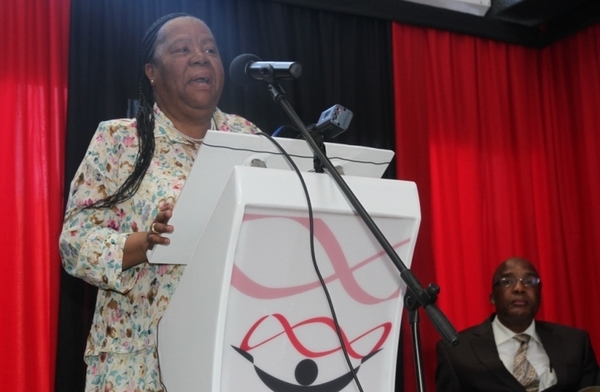SA vaccines get a shot in the arm

The $20-million partnership between pharmaceutical giant Pfizer and South Africa’s Biovac Institute was “the beginning of the establishment of vaccine manufacturing capabilities on the continent”, science and technology minister Naledi Pandor told GroundUp.
On Tuesday, the South African government, which owns 47.5% of Biovac, and Pfizer announced a five-year partnership that will see Biovac manufacture Pfizer’s pneumoccocal conjugate vaccine Prevenar-13 through a technology transfer agreement. Prevenar-13 vaccinates against bacteria that cause pneumonia. According to the World Health Organisation, pneumonia is the leading infectious cause of death in children worldwide, accounting for 15% of all deaths of children under the age of five.
This particular vaccine, which was first introduced into South Africa in 2009, accounts for 40% of South Africa’s vaccine budget, Pandor said. “There is more we can do to cut the costs of the vaccine, and that is to manufacture the vaccine in Cape Town,” she said.
Health minister Aaron Motsoaledi told Parliament earlier this year that the country spent about R450-million on the pneumoccocal vaccine. Following its introduction in 2009, the National Institute of Communicable Diseases found a “70% decline in invasive pneumococcal disease in children under the age of five”, Motsoaledi said in May.
While the Prevenar-13 would be manufactured at Biovac’s Cape Town manufacturing plant, part of the agreement between Biovac and Pfizer involved a skills-transfer process so that Biovac would be able to produce the vaccine after the technical transfer period. At the moment, Biovac procures and supplies all vaccines to the department of health.
“Biovac aims to revitalise human vaccine manufacturing in South Africa by building capacity in all aspects of vaccine development and manufacturing, from products for clinical trial to full-scale commercial production,” Pandor said.
South Africa was “committed to the establishment of the necessary initiatives and infrastructure that will assist in the development of the pharmaceutical value chain”.
While reducing costs was part of the drive to manufacture the vaccine locally – although none of the stakeholders said by how much the R600 shot of the vaccine would decrease – Motsoaledi, who was at the launch in Cape Town, said: “By having Biovac manufacture the vaccine locally, this will be transformative not only to Biovac but to the country by ensuring affordable, consistent and reliable supplies to the department whilst ensuring that Biovac gets to be upskilled and the trade deficit gets reduced in times.”
However, Andy Gray, a pharmacologist at the University of KwaZulu-Natal, says: “There is a long history of trying to rebuild SA’s vaccine manufacturing capacity, with little evidence yet of real progress.”
He says: “The question that needs to be asked, though, is whether the current method of supporting industry is effective. Biovac is paid a proportion of the total state vaccine spend in return for procuring and distributing vaccines. This deal has been in place for many years, so the extent of support is substantial.”
Gray also questions what is meant by “local production”. “If the actual ‘active ingredient’ is still imported, but only locally formulated, then some price advantages may be possible, but security of supply will not be changed.”
The issue of locally producing the active pharmaceutical ingredient (API) in pharmaceuticals has been on the table for a while. Ketlaphela, a government-driven public-private project to produce APIs within South Africa, was first announced in 2012 – specifically for antiretroviral medication.
APIs are contained in all drugs, but are formulated in different ways, depending on the drug they will be used in. However, Ketlaphela stalled in 2013, when Swiss pharmaceutical company Lonza pulled out of the partnership.
Asked about Biovac’s relation to Ketlaphela, Pandor said: “We’d certainly like them to collaborate with Ketlaphela. A vaccine manufacturing entity in a biotechnology park is something we’re looking to create in the future in the Western Cape.”
Support independent journalism
Donate using Payfast

Don't miss out on the latest news
We respect your privacy, and promise we won't spam you.

This article is licensed under a Creative Commons Attribution-NoDerivatives 4.0 International License.
